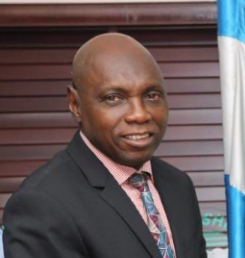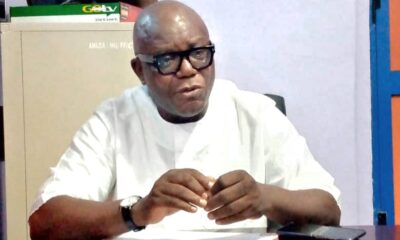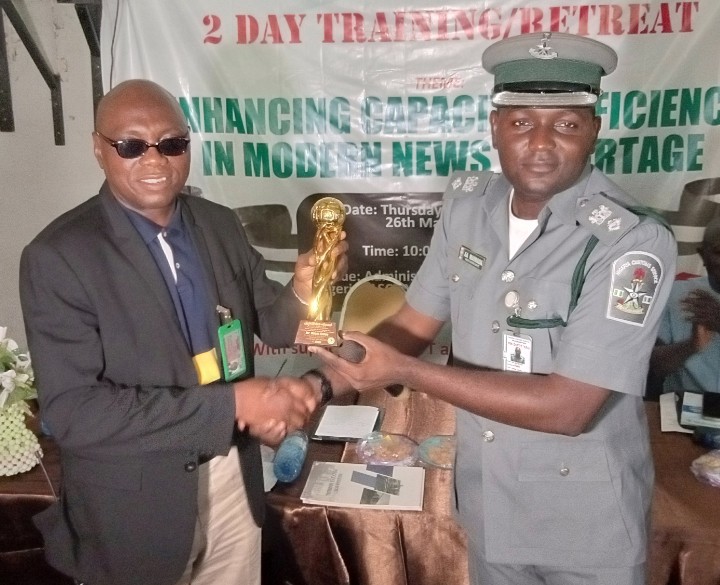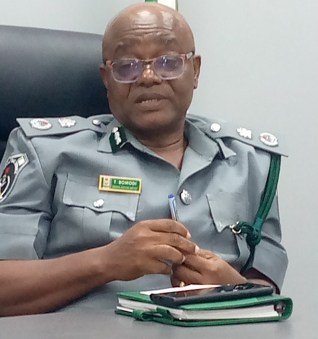Maritime
‘We saved foreign cargo ships N3.2bn bribe in 9 months’- PSTT Coordinator

Coordinator of the Port Standing Task Team, PSTT, Mr. Moses Fadipe has said the port system has been cleared of all environmental and human factors inhibiting free flow of trade, in and out of the nation’s ports.
In a chat with Eguono Odjegba, Fadipe disclosed that since the establishment of PSTT, the issue of extortion and bribe taking has reduced drastically, saving foreign liners N3.2billion.
He says port users and players, whether government or the organized private sector have since the Task Team involvement in ports activities attuned to business best practices, noting that the port trade is no longer what it used to be in terms of negative ratings and compliance level, which he said is presently at 80 percent. Excerpt:
I understand your mandate begins with the arrival of ships at the port, do you have officers go into these ships like maybe customs officers and port health officers?
No, but we are involved in another platform that may do so. Before we started, we set up a platform with Maritime Anti Corruption Network, MACN, and Convention for Business Integrity, CBI. The platform existed earlier and was then known as Platform and Help Desk Platform, PSSP. CBI is an interface for MACN in Nigeria and interacts with the Federal Government and NCS. Before any vessel gets here a pre-arrival notice is sent to the platform with information such as location, time, etcetera. If a Customs or Immigration officer boards the vessel and is bothering ship the Master or doing something out of line, they will quickly get cross to us via the platform. They also have access to online ‘Vessel flyers’ put in place by the Nigerian Government which the ship Master knows and must comply with. Anything aside this is illegal, because we have other people on the high sea such as crude oil vessels, 100 nautical miles up the high sea, through which we call feedback. The feedback forms speak to a lot of things like observation of the Master from fairway buoy to the berth, and back to fairway buoy. It is through such feedback we know where something has gone wrong and the urgent need to do post audit.
We monitor when a vessel gets to anchorage and pays its dues to NPA, and a pilot is assigned. While it was in anchorage and has paid its dues, it is our business to know how long it takes the NPA to assign a pilot. Since you aren’t there, that is the type of feedback you get from the Master. We monitor how long it takes the assigned pilot to board the vessel? How long does it take the vessel to be piloted? Even when it’s at the berth, how long does it take our officials to board it? These are the feedbacks we work with. In the past in the Lagos axis, it takes five hours from anchorage to the berth, but all that have changed; it is now two hours maximum since the coming of PSTT.
What really is your Team’s term of reference?
Our term of reference is to sanitize our port processes, eliminate unnecessary hurdles that impacts negatively on costs and to ensure that the right atmosphere for trade facilitation is restored. We are active in Lagos, Port Harcourt and Onne ports, and our Team is under the supervision of the Office of the Vice President through the Federal Ministry of Transportation.
As you may already know, we are guided by ports Standard Operating Procedures, SOP, which defines what the private and government agencies do in the ports, and how they interface to ensure that trade is facilitated and that services are delivered at efficient cost. Remember that everything we are doing derives from the Nigerian Port Process Manual, NPPM.
How does the SOP work?
The SOP is based on three key issues, “who am I in the port, what I do and how I carry out my activities”. The NPPM highlight all the ports activities in the SOP and they now try to attach timelines to these activities. Anything outside of this means an infraction, and our Team will hold the service provider or service user, responsible. To give you a background, when the NPPM was launched in December 9, 2020 government decided to oversee its implementation through monitoring of the document to ensure compliance by different agencies. The Independent Corrupt Practices and Other Related Offences Commission, ICPC, and the Department of State Services, DSS, are members of the PSTT. The PSTT in its own wisdom decided to bring in the Nigerian Port Authority, NPA, being landlord of the ports.
Out mandate includes anti-corruption monitoring to dismantle the corrupt networks fueling the ports traffic logjam, carrying out regular operations in the port to generate evidence based infractions against the SOP and the NPPM; and promoting activities and processes that will aid the ease of doing business. We also act on intelligence given by any government agencies or even organized private operators to enforce compliance.
Looking back, how would you describe the journey so far?
I will say it has been a mixture of good, bad and ugly. It is important to understand that the port manual is built on five key areas: ship arrival and departure; terminal operations; customs clearance of goods from the ports; immigration and port health activities. Looking at these five key areas, it is a holistic operation, right from when the vessel comes in until it departs. After the vessel has left, terminal operations set in and those key actors come into play. So, the Task Team looked at the volume of this work and decided to do it in phases. We decided to start with ship arrival which takes us to vessel boarding and rummaging. In the past all vessels coming to Nigeria are afraid, they engage Captains that can go to Bonny for instance.
Why the fear, insecurity?
Not insecurity as such, it is because of the level of extortion onboard vessels. I don’t know whether you are you aware of the existence of an agency called the Maritime Anti Corruption Network, MACN. This body comprise of over 171 maritime member nations, including Nigeria. They came up with a special committee on Bonny, with a position that the minimum amount a ship Captain takes spends going to Bonny without problem is $20,000. So, any captain coming to Nigeria will demand that amount to navigate our waterways; whereas going to Cotonou a ship captain needs only $1,000; while same trip to Togo and Ghana they don’t get to part with a dime. Presently, in Bonny, government agencies will come onboard, do their job and go away for you not to be disturbed.
Even when they are here in Nigeria, the average time it takes an agency onboard your vessel is 90 minutes. They also complain about proliferation of agencies; whether you are on uniform or not, everybody just board vessels. Ship captain gets worried because such delays will affect the budget in place to meet up with at other port calls. So he will want to do everything within his powers to leave the port as quickly as possible. That is why we took interest in that particular area. We have sanitized Bonny and captains are now free.
What exactly did your Team do to surmount that challenge?
What we did there was to identify all the agencies qualified to board vessels, because the manual captured vessel boarding as part of the process. The manual clearly stated that the Port Health are the first to board, and until they declare it safe nobody else can board. What this means is that if a vessel berths 1800hrs and the Port Health doesn’t come till the next day, then nobody can board the vessel. Our Team ensured that Port Health must board latest 30 minutes after the vessel has been moored. We make the Port Health authority explain if it doesn’t do so at the stipulated time. Another question is how many people from Port Health are required to board vessels; the document pegs it at three people. Anything aside that is an infraction, we also ensured that is maintained, they can even go with a lesser number of personnel, but not more than the stipulated three. When you are onboard the vessel, the document allows you to be there for only 45 minutes maximum, and failure to disembark at the given time also requires a written formal explanation to the PSTT.
After the Port Health, Customs is next with two personnel, followed by Immigration Service with three personnel, to board jointly, unlike in the past when they come separately at their own convenience. The captain also attends to them at the same time, and the maximum time allowed is 30 minutes. We ensured we reduced delay and have been able to entrench transparency, which will help reduce cost. While the Customs and Immigration Service are still on board with 15 minutes left of their inspection time, which together 45 minutes spent by Port Health makes it an hour on the dot, to see the ship’s manifest and other relevant documents; Customs must break bulk and continue with the other part of the exercise.
This is a clear departure from what was the case in the past when the vessel will be unattended to, while the ship continues to pay money for the number of days it remains there. When there is an infraction on the part on the vessel captain, they must disembark with the agent of that vessel to their office; otherwise, we hold them responsible for overstaying on the vessel because it is an infraction.
How are infractions by any foreign ships treated by your Team and indeed other relevant agencies like the customs, port health and immigration?
We take note of the fact that vessel are more or less a foreign country, so while going in; you will have to register at the gangway. That entails that you produce your name, ID card number, and then sign in. Normally, the captain as the host would offer a souvenir which represents a gift, but the present policy of the Nigerian government is zero tolerance for gift. Those onboard the ship can indulge in some form of hospitality offered by the captain, but nothing must be brought out, as doing that is an infraction. The names of everyone who boards a vessel must be documented. Our Team doesn’t allow the practice where some government officials write just a name of one person when three actually boarded. For example, an Immigration officer can write Martins plus two; we don’t allow it because the other two are unknown.
Should anything happen on that vessel and they are needed, it might be difficult to identify them and that incident may be tied to the unknown persons. If there is classified information, agencies like the DSS can board a vessel anytime. The National Drug Law Enforcement Agency, NDLEA can also do same if there is information on the importation of banned substances like Tramadol on the vessel. The Nigerian Maritime Administration and Safety Agency (NIMASA) can board for safety issues and the rest. If it is established that a vessel is in violation and the issue cannot be resolved within the expected time of departure, we have what is called “bond indemnity” that allows the vessel to sail while its agent is held responsible. Indemnify the vessel since you are the agent; let the vessel go, while we resolve the case since it is not criminal.
What if the violation is criminal like shipment of cocaine?
Well that is not part of our terms of reference; we work specifically within our mandate. Normally, complaints are resolved within a week or maximum of ten days, the vessel pays $20,000 per day during that period as demurrage. If it takes seven days to resolve the issue, that’s $140,000 and $200,000 for ten days. Presently, our Team ensures that no dispute takes more than four hours to resolve, so no ship has any justification to stay there and pay $20,000 per day for demurrage. This has helped our image significantly because a ship master knowing full well that his issue will be resolved timely no longer feels obliged to give bribe. You will definitely be dealt with for doing something wrong, but there is a timeline for everything. Within the nine months of our operation we have been able to saved N3.2bn for these vessels.




























